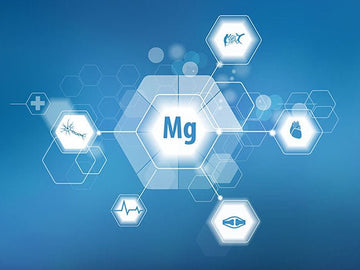Magnesium is an essential macrominerals we can not be healthy without as it plays an important role in various physiological roles in the body. The name derives from Magnesia, one of the regional units of the Greek, part of the region Thessaly, where Magnesium used to be used for medical purposes in ancient Greek.
Why are so many people deficient in Magnesium, if it is such an important and abundant mineral?
Magnesium is widely distributed in plant and animal foods and in beverages and it seems to be easy to get it from diet. The problem is, that the amount may not correspond to the values that our body actually absorbs (approximately 30% to 40% of the dietary magnesium consumed is typically absorbed). There are several groups of people, which are at risk of magnesium inadequacy because they typically consume insufficient amounts, they take some medications influencing absorption or they have medical conditions that reduce magnesium absorption from the gut or increase losses from the body.
There are several factors that influence Magnesium intake level.
You may have heard about antinutrients, which can actually prevent the absorption of certain nutrients. This is caused by a compound called phytic acid, naturally found in most plants, but in especially high quantities in grains and legumes. Also some minerals (for example Calcium), insoluble fibers or high amounts of phosphorus can be liable to impair magnesium absorption. Other factors affecting magnesium status and where magnesium supplementation is advised, are its reduced absorption by malabsorption issues and bowel diseases, reduced intake due to diets high in heavily refined and processed foods, using some medicine that lower magnesium absorption or increased requirements due to stress, anxiety, pregnancy or some health conditions. Any stress, whether mental or physical, will deplete magnesium from the body.Magnesium - crucial for healthy bones and teeth
An adult body contains approximately 20 - 30 g Magnesium, with around 60% present in the bones. That is why low serum magnesium is associated with low bone density. Around 40% of magnesium in the body is deposited in soft tissues like muscles (especially heart and skeletal muscle), where influencing regulation of muscle contractions. It acts here as a natural calcium blocker, helping your muscle cells relax after contracting.
Magnesium as an important enzyme cofactor
Magnesium is predominantly an intracellular cation (>99%). Inside our cell influences a number of enzyme functions (over 300 enzymes are dependent on magnesium), many of them involved in energy metabolism. Magnesium cations are bound to DNA and reduce the negative charge density, thereby stabilizing the structure of DNA. Magnesium is required for DNA replication, transcription into RNA and translation into protein.
Imagine, just to move only 1 finger, we need this mineral in several steps. First, to create brain peptides, also neurotransmitter acetylcholine to relax our muscles after contraction. Than it carries the information of movement - via nerve signals from the brain to our fingers. Also it helps to relax the muscle after the movement. And these are only a few functions of it.
Magnesium, as the powerful relaxation mineral for nerve and muscle functions
It helps in the regulation of action potential: muscle, heart, nervous system and gastrointestinal system. Magnesium acts as a natural calcium blocker, helping your muscle cells relax after contracting. When magnesium levels are low, your muscles may contract too much and cause symptoms such as cramps or muscle spasms or eyelid twitching. Magnesium influences innervation (the supply of tissue with nerve fibers), nerve transmission and neuromuscular conduction. That is the reason why Magnesium deficiency therefore affects the overall well-being and manifests itself in nervousness and states of inner turmoil. By supplementing with Magnesium, we restore our body's physiological balance, bring it to a quiet state and at the same time pour in new energy. Magnesium relieves the nervous irritability and excessive energy that give rise to fatigue in the first place.when a person's magnesium level is subnormal, the nerves are unable to control such functions as muscle movement, respiration, and mental processes.

Magnesium and cardiovascular system
Number of studies point to the protective role of Magnesium in cardiovascular diseases. It can help to dilate the endothelium-impaired vessels and it is also important to maintain healthy heartbeat. Low magnesium intake has been linked to high blood pressure, arterial plaque build-up, calcification of soft tissues, cholesterol, and hardening of arteries. The optimal amount in the blood ensures blood flow and prevents thrombosis and heart attacks. Magnesium also affects cholesterol levels by inhibiting the enzyme for cholesterol synthesis (like statin drugs). Actually it helps to keep cholesterol in balance by blocking its synthesis when there is an excess or accelerating the production when there is a shortage.Thanks to the same mechanism of dilating vessels, Magnesium can be used to treat and prevent migraine symptoms.





















